Dayton Wheels Vs Budd Wheels: The Ultimate Showdown
When it comes to choosing the right wheels for your vehicle, you’re often faced with a difficult decision. Do you opt for Dayton Wheels vs Budd Wheels? Both have advantages and disadvantages, so it can be hard to determine which type is best for you.
Both of these companies have been making quality wheels for decades and have a long history of reliable and dependable products. But which one is the better choice? Today, we’re going to take a look at both of these popular brands and find out who comes out on top in the battle of the wheels – Dayton vs Budd.
In today’s guide, you will read about the:
- Different types of semi-truck wheels
- Pros and Cons of Dayton and Budd wheels
- Method to change Dayton wheels into Budd wheel
- Dayton truck wheels’ torque specs
- Ways to identify a real Dayton wheel
Table of Contents
What Are Budd Wheels?
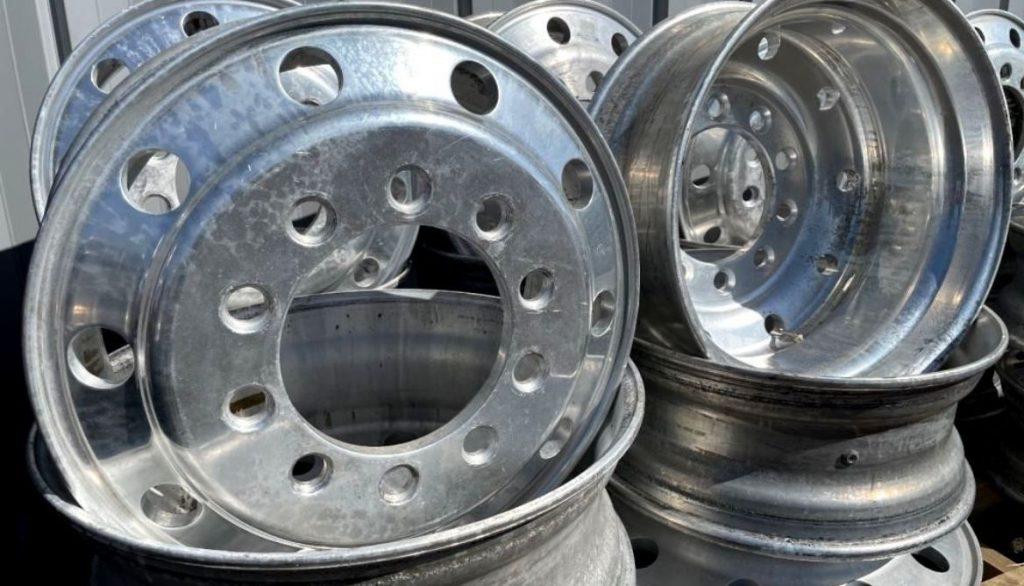
These wheels were first developed in the early 1900s by Edward G. Budd. The company is based in Philadelphia, Pennsylvania and produces both sturdy and reliable wheels for various purposes. These include passenger cars, freight cars, light trucks, buses, trailers, and more.
These disc wheels are constructed from various materials, such as steel and aluminum, and feature different tread patterns to accommodate different driving conditions. While these wheels have been around for many years, they are still considered reliable for commercial and industrial vehicles today.
Here are some features that make Budd a great choice:
- Durable construction from materials such as steel and aluminum
- Different tread patterns for different driving conditions
- High load-carrying capacity
- Popular for custom car enthusiasts for their attractive design
- Meets the needs of commercial and industrial vehicles
- Optional parts available at most tire dealerships
Semi-Truck Wheels: A Guide To The Different Types
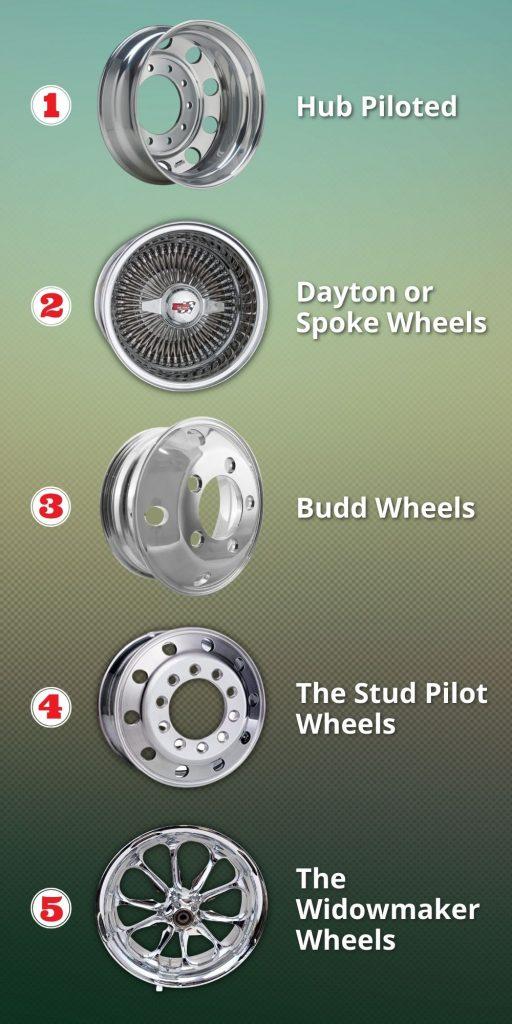
Let’s take a look at the 5 different types of the semi-truck wheels.
Hub Piloted
When it comes to semi trucks, the wheels are an essential part of the vehicle. There are different types of wheels or disc wheels for these large vehicles, and one of the most popular are the hub piloted wheels. It’s one of the most reliable options available and offers a range of benefits to truck owners and operators.
Dayton Or Spoke Wheels
The Spoke or Dayton style wheels are often seen on many types of trucks and trailers and have become a standard in the trucking industry. These Dayton style wheels are characterized by having multiple spokes radiating from the center hub outwards towards the outer rim.
This design is strong, lightweight and aesthetically pleasing, making it a great choice for many types of vehicles.
A Dayton style wheel is strong and durable, making them ideal for heavy-duty loads. They are also lightweight, which can reduce fuel costs. The spoke wheels are easy to customize with a variety of colors and finishes for different tubeless tires.
Budd Wheels
Semi-trucks often rely on wheels to make their long hauls, and Budd-style wheels are popular for this purpose. These wheels are constructed out of stamped steel and feature five or six spokes that are strong enough to support the weight of a heavy truck.
Although they are built to be robust and resilient for tubeless tires, there are both advantages and disadvantages to using wheels of Budd.
The heavy steel construction makes them extremely durable and able to withstand tough conditions. They provide superior stability and performance due to their wide wheel base. They are also relatively easy to replace since they are a single piece construction.
The Stud Pilot Wheels
The stud piloted wheels feature a center hub that is designed with several studs, or mounting points, around its circumference. These studs allow the wheel to be attached to the hub of the axle and provide a secure connection for the wheel to rotate. Stud pilot wheels are an extremely popular choice for many vehicles and offer several distinct advantages.
The Widowmaker Wheels
The Widowmaker wheel has been around for many years, and is still popular today. The distinctive style of this wheel is instantly recognizable due to its thick, five-spoke design that provides both strength and style to the vehicle.
As its name implies, it is not the most forgiving wheel type and can be unforgiving to those who take corners too hard or drive recklessly.
Dayton Wheels Semi
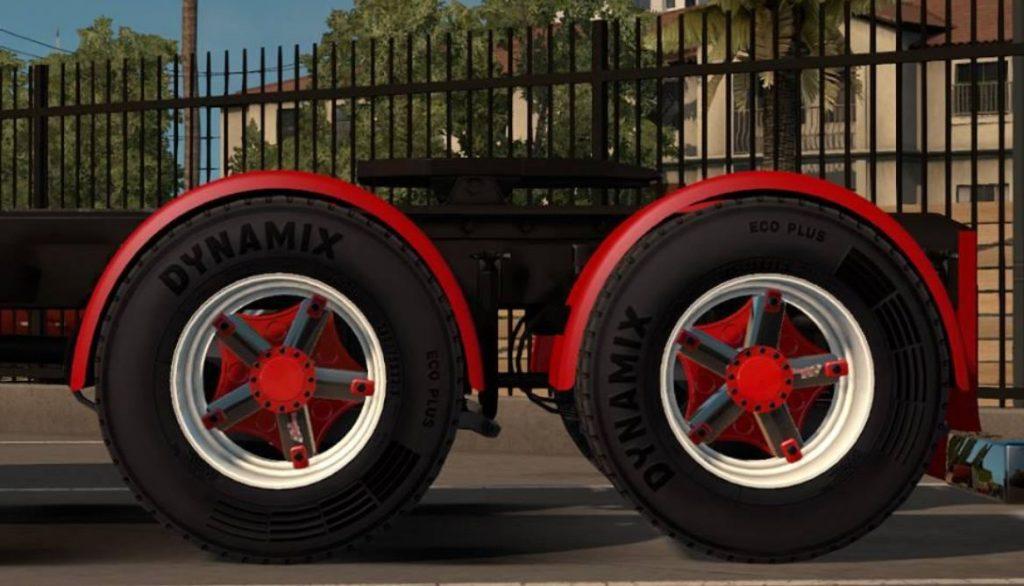
Dayton style Wheels Semi are a type of wheel that is commonly used in semi-trucks and commercial vehicles. The Dayton brand is a trusted name when it comes to heavy duty wheels, offering a wide selection of sizes, styles and finishes for any truck application.
Dayton feature a solid construction and are designed to provide superior stability, strength and performance under a variety of conditions. They are manufactured using high-grade alloy materials, which makes them resistant to corrosion and provides longer life spans.
The split rims are designed with a single piece spoke pattern, which helps to disperse weight more evenly. This feature allows the wheels to handle heavier loads more easily and provides improved traction when traveling off road or on uneven surfaces.
In addition to their durable construction, Dayton wheels are also known for their stylish designs. The range includes multiple finishes including chrome and gloss black, as well as bright colors like red and blue. The combination of sleek style and reliable performance makes these wheels a popular choice for semi-trucks and other commercial vehicles.
At the end of the day, Dayton Semi offers drivers the confidence of a reliable and safe driving experience. With its superior design and construction, these wheels are sure to provide years of quality performance.
Budd Style Split Rims
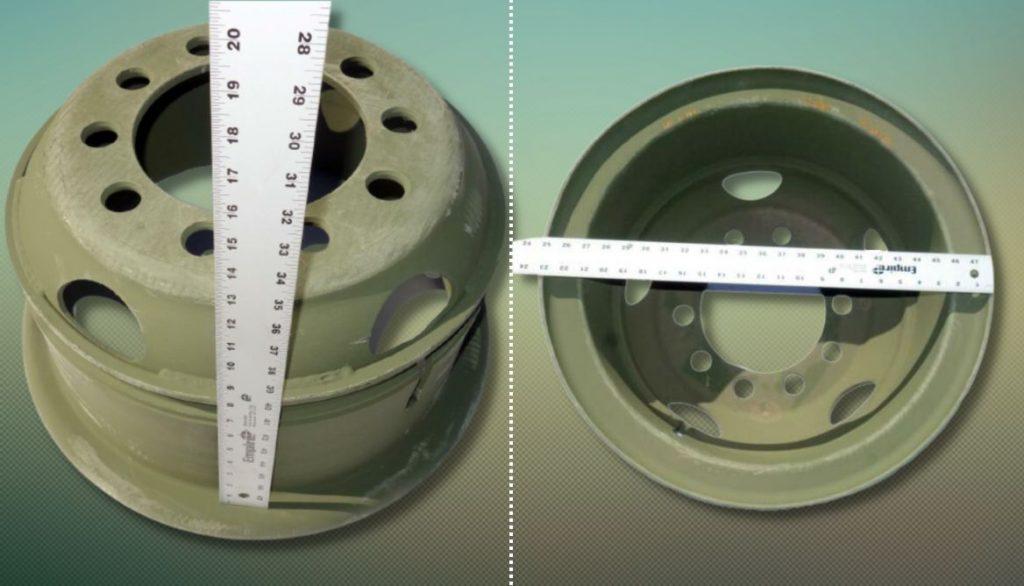
Overall, Budd style rims provide an attractive, strong, and reliable option for anyone who wants to customize their vehicle. With the right tires, these rims can turn any car into a performance machine. So if you’re looking for a rim that is both stylish and practical, then these tubeless rims are definitely worth considering.
They’re affordable and easy to install, but it’s important to remember that each vehicle has its own needs in terms of wheel size. If you want your new set of wheels not only to look good but also last for a long time, be sure you get the right size. And don’t forget about things like tire pressure monitoring systems and valve stems when deciding on which tires to buy.
Decide On The Right Size
When it comes to choosing the perfect Budd rims for your vehicle, size is an important factor to consider. It’s important to make sure that the wheels are the correct size for your car.
To determine the right size for your vehicle, you will need to check the manufacturer’s recommended wheel size for your car. This can usually be found in your owner’s manual or on the vehicle’s identification label.
Pick The Right Material
When choosing these rims for your car, the material you choose is one of the most important decisions you will make. There are many options available, and each has its advantages and disadvantages.
When choosing the right material for your Budd rims, consider your driving habits, budget, and the conditions in which you will be driving. Each option has its pros and cons, so weigh them carefully before making your final decision.
Consider The Weight
The heavier the rim, the more it will affect the performance of your car. Heavier rims can cause more strain on the suspension, which can reduce traction and handling, as well as increase stopping distances.
The manufacturer should be able to provide you with an accurate weight limit for your car’s make and model. Once you know the weight limit, you can then decide if a heavier or lighter rim would be best.
Dayton Wheels Vs Budd Wheels Pros And Cons
Here we will discuss the pros and cons of these two wheels.
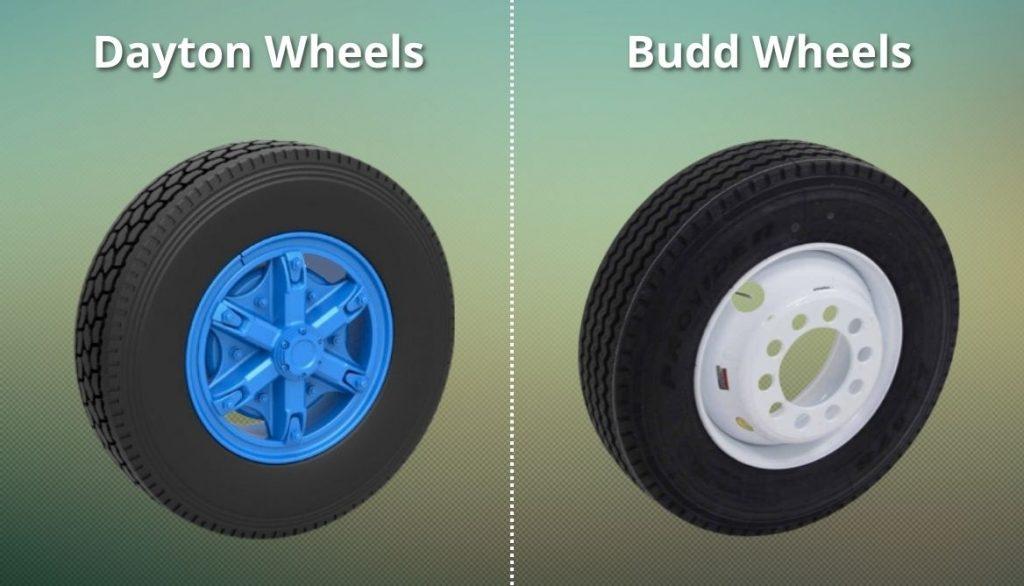
Dayton Wheels
Pros
- Durability: The wheels made by Dayton are known for their durability and long-lasting quality. Dayton uses high-grade materials when making their wheels, ensuring that they can handle a lot of wear and tear without cracking or bending. If you’re looking for a set of wheels that will last you years, these Wheels are a great choice.
- Style: As previously mentioned, Dayton offers a wide variety of styles and sizes, so you can find something that perfectly fits your vehicle’s personality. From classic chrome designs to modern black rims and brake drums, there is a Spoke Wheel to match any vehicle.
- Price: Spoke Wheels are also known for being surprisingly affordable. Whether you’re looking for something budget-friendly or something more luxurious, these Wheels have something for everyone.
Cons
- Size Limitations: These Wheels may not be able to accommodate larger tires, which can limit your tire options when choosing tire size.
- Quality Control: There have been reports of poor quality control with Dayton hubs, meaning that your wheels may not properly balance or fit securely on your vehicle.
- Customer Support: Customer support from Dayton is often lacking, meaning that any questions or problems you have with your wheels may go unanswered.
Budd Wheels
Pros
- Durability: One of the biggest advantages of these wheels is their incredible durability. They are made from strong alloy steel, which makes them incredibly strong and resilient. This means you won’t have to worry about your wheels breaking down or wearing out quickly.
- Smooth Ride: Another great advantage of a Budd Wheel is that they provide a smooth and comfortable ride. The wheel’s unique design allows for a comfortable ride with perfect brake drums, even on rough terrain.
- Affordable: Finally, these wheels are relatively affordable compared to other wheel designs on the market. This makes them an attractive option for people who want a good wheel at an affordable price.
Cons
Here are some of the disadvantages of using a Budd Wheel.
- Heavy: They tend to be heavier than other wheel types, which can cause them to wear down faster and make them difficult to maneuver. This can also increase the cost of maintaining your vehicle because you may need to replace the wheels more often.
- Need specialty tires: Specialty tires tend to be more expensive than regular tires, so you may need to spend more money on your tire purchase if you choose to use these wheels. It can also be hard to find specialty tires that properly fit these wheels.
- Some people have found that the braking performance of a Budd Wheel is not as good as other wheel types. This can be dangerous in emergency situations, as brakes are one of a vehicle’s most important safety features.
Are Dayton Rims Safe?
Dayton rims can be a great choice for drivers who are looking for a reliable and aesthetically pleasing option for their wheels. However, it is important to consider safety when choosing any type of wheel.
Fortunately, there are several tips you can follow to make your Dayton rims safer for driving.
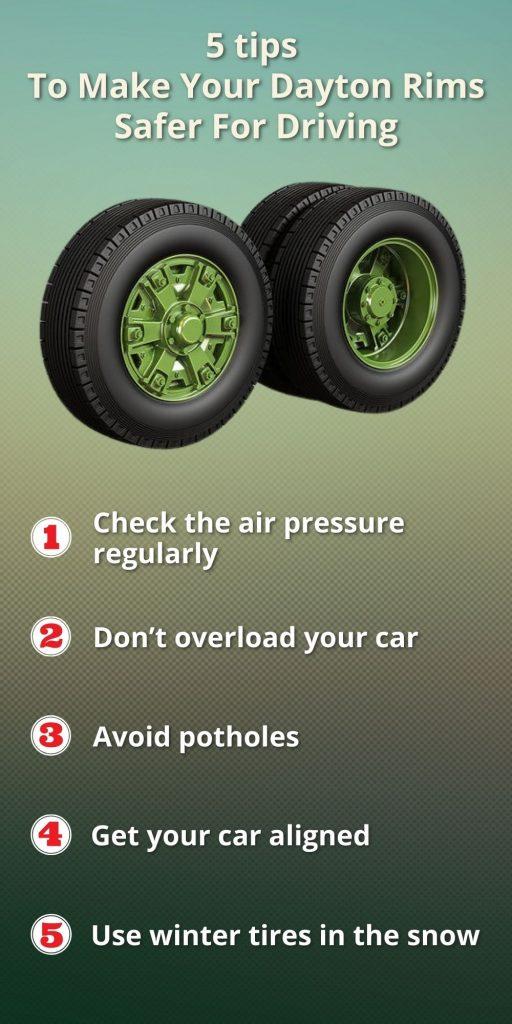
- Check the air pressure regularly: Incorrect tire pressure can cause problems. To ensure that your tires are properly inflated, check the air pressure at least once a month, or whenever you fill up with gas. You can use a digital or analog tire pressure gauge to check the pressure.
- Don’t overload your car: Excessive weight can cause extra strain on the rims and tires, which can lead to a dangerous blowout or even loss of control. To ensure your safety, make sure to check the load capacity of your car and only drive with the recommended amount of cargo and passengers.
- Avoid potholes: Potholes are a major safety hazard when it comes to driving on Dayton rims. It is important to avoid potholes whenever possible, as they can cause serious damage to your vehicle and may even result in an accident.
- Get your car aligned: One of the most important things you can do to make your Dayton rims safer for driving is to ensure they are properly aligned. This means checking your car’s camber, caster, and toe angles. If these angles are off, it can cause your tires to wear unevenly and cause instability while driving.
- Use winter tires in the snow: It is best to switch your tires to winter ones in advance of the snowy season to ensure that your car is ready. Remember to always check the air pressure in your tires, as the colder weather can cause them to deflate quicker than usual.
Can You Change Dayton Wheels To Budd Wheels?
If you’ve been searching for ways to upgrade your wheels, you may wonder if it’s possible to change Dayton wheels to Budd wheels. The answer is a resounding yes!
Changing your Dayton to Budd can provide a number of benefits to your vehicle. These changes will give your car or truck a new look and make it more stylish. Additionally, these wheels are known for their strong construction and durability, so you can rest assured that your investment will last you for years to come.
Before making the switch, however, it’s important to ensure that your new wheels are compatible with your current setup. You’ll need to check the wheel size, bolt pattern, and offset in order to ensure that the wheels fit properly.
If you’re unsure, it’s always best to consult a professional. Once you have the right wheels in place, you’ll be ready to hit the road in style!
Dayton Wheels To Budd Wheels
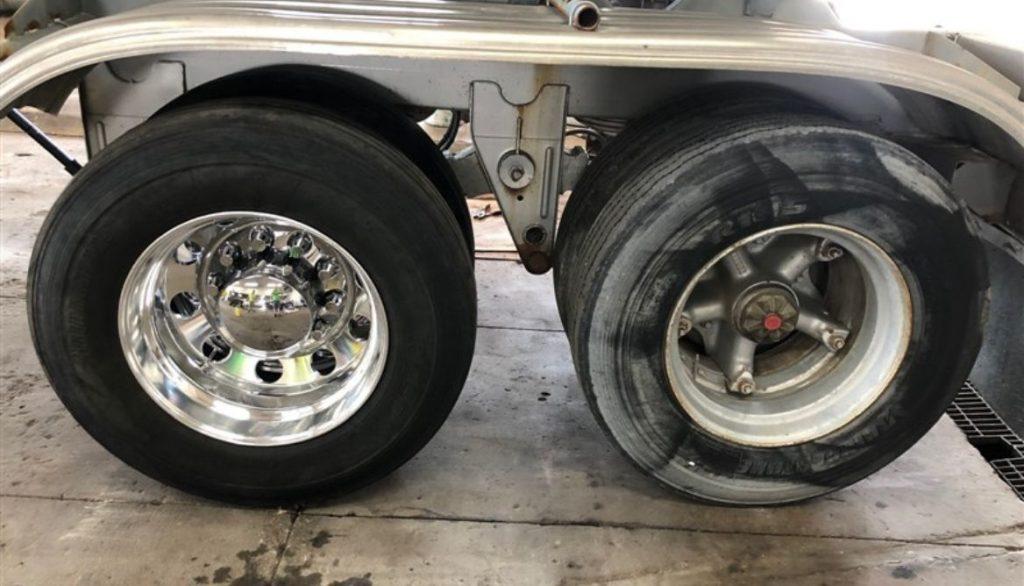
This process of conversion consists of five different steps.
Step 1: Remove The Old Wheels
If you’re looking to upgrade your wheels from Dayton to Budd, the first step is to remove the old wheels. Depending on your vehicle, there are a few ways to do this.
If you have a truck, you may need to jack up the truck and use a breaker bar to loosen and remove the lug nuts. Once the lug nuts are removed, carefully slide off the wheel and tire.
If you have a car, there is no need to jack it up, as the car’s weight will be enough for you to work with. Start by loosening the lug nuts with a wrench or socket set. Once the lug nuts are loose, use a car jack to lift the car slightly, and then remove the wheel and tire.
Step 2: Clean The New Wheels
Once you have acquired your new Budd wheels, it is important to clean them properly before beginning the conversion process. Cleaning your wheels can help ensure that the job is done properly and that the conversion is successful.
The best way to clean your wheels is with a soft, lint-free cloth and a mild detergent or cleaning solution. Be sure to use a non-abrasive cloth and cleaning solution, as harsh detergents and abrasives can damage your wheels.
Start by wiping off any excess dirt or grime from the wheel’s surface, and then use the cleaning solution to remove any remaining dirt from the split rims. After the wheels have been thoroughly cleaned, you may want to use wax or polish on them to help protect the finish.
Step 3: Install The New Wheels
Now that you have acquired and prepared the new wheels, it’s time to install them! This is the most important step in the conversion process, as proper installation of the wheels ensures a safe and reliable ride.
Before you begin, ensure that you have all the necessary tools on hand. You’ll need an adjustable wrench, a socket wrench, and a tire iron. Also, ensure you have access to a jack for lifting the vehicle.
When you’re ready to begin, start by jacking up the vehicle so you can get to the wheels. You’ll need to remove the lug nuts holding the old disc wheel in place, which can be done using the socket wrench.
Once all the lug nuts are off, you can replace the old wheels with your new Budd wheels. Make sure to use the tire iron to tighten the lug nuts securely.
Once the new wheels are in place, it’s important to check that they are balanced properly. Unbalanced wheels can lead to an uncomfortable ride and wear out your tires faster. If necessary, you can take your car to a shop and have them balanced for you.
Step 4: Check The Torque
Once your wheels have been removed and the wheels have been installed, it’s time to check the torque. This is important as it ensures the wheels are securely attached and will not come loose during use.
You’ll need a torque wrench and a socket set to check the torque. Begin by placing this wrench onto the wheel nuts, split rim or bolts. Make sure it is connected securely. Then, start turning each nut or bolt in a clockwise direction using the socket set. As you turn each one, pay attention to the readings on the torque wrench.
When you’ve gone through all of the nuts, brake drum, disc wheel, tubeless rim and bolts, compare the readings on the torque wrench to the manufacturer’s recommended torque settings for your vehicle. If any of the readings are significantly lower than recommended, you’ll want to re-tighten those particular nuts and bolts until the readings match up with the recommended settings.
Step 5: Inflate The Tires
The fifth step in converting Dayton to Budd is to inflate the tires. This is an important step as it helps ensure that the wheels are properly balanced and have a better grip on the road. It also helps reduce the risk of a tire blowout, which could be dangerous.
To inflate the tires, you will need a tire pressure gauge and an air compressor or hand pump. First, use the pressure gauge to check the tires’ current pressure and ensure they are within the recommended range.
Once you have determined the desired pressure, you can use the air compressor or hand pump to add air to the tires.
Be sure to add the recommended amount of air and do not over-inflate them; otherwise, it will damage your brake drum.
Dayton Truck Wheel Torque Specs
Different Ways To Tell If Dayton Wheels Are Real
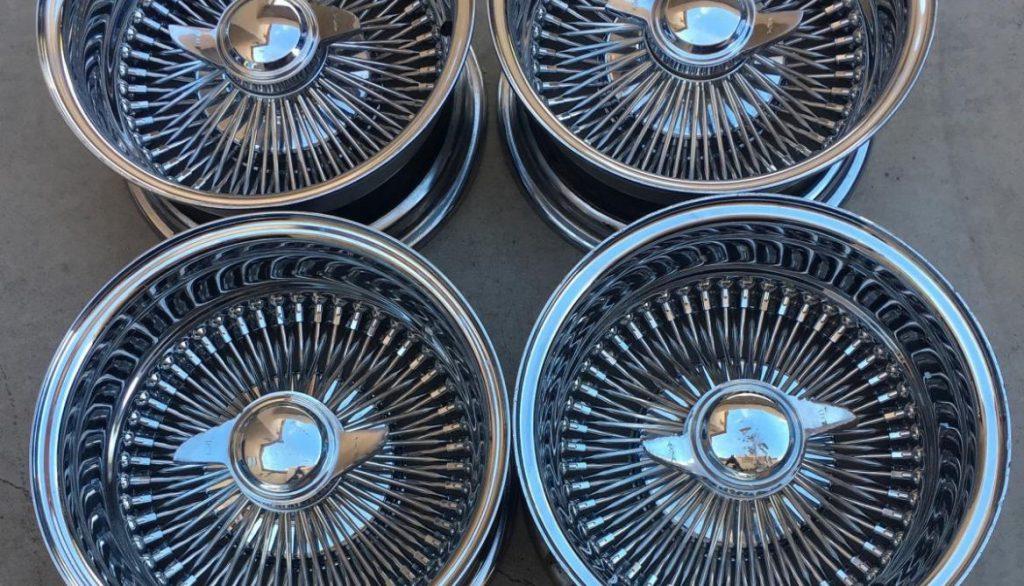
Are you shopping for Dayton wheels but aren’t sure how to tell if they’re real? With so many counterfeit products on the market these days, it’s important to know how to spot the difference between real and fake Dayton wheels. Fortunately, there are several ways to ensure your wheels are authentic.
Check For The Quality Stamp
These wheels are always stamped with a unique quality mark that indicates the manufacturer, production date, and quality assurance. This quality stamp will be found on the back of the wheel, usually near the hub, and should be clearly visible.
Additionally, the stamp should be crisp and clearly legible, so if you notice any signs of fading or discoloration, it could indicate that the wheel is not genuine. Be sure to check this quality stamp before you purchase your wheels to ensure they are authentic.
Remember that counterfeit wheels may also have their own quality stamps, which may look similar to the original. However, these stamps will often contain typos or misspellings and sometimes won’t even mention the company’s name at all.
Examine The Spokes
Another thing to look for when determining if your Dayton wheels are real is the spokes’ quality. It’s important to check for any damage, rust, or corrosion that may have affected the integrity of the spokes. If the spokes appear to be in poor condition, it’s likely that the wheels are not genuine Dayton products.
You should also check for any missing or loose spokes and any bends or breaks in the spokes. Real wheels typically use high-grade, stainless steel spokes that will be straight and free of any damage.
If you’re unsure if the spokes are genuine Dayton components, you can compare them with those on a known authentic set of these wheels. Be sure to pay attention to the details like spoke width, thickness, and material.
A genuine Dayton-style wheel typically features thinner, lighter-weight spokes than most other brands. They also tend to have slightly rounded edges as opposed to sharp corners.
Hold The Wheel Up To The Light
When it comes to determining if a set of Dayton is real, one of the best methods is to hold the wheel up to the light. This will allow you to look for any imperfections or inconsistencies in the construction of the wheel. Look for any air bubbles, wavy edges, or any other signs that the wheel was not made with precision and care.
If you notice any of these issues, then chances are that the wheels are not authentic Dayton Wheels. Additionally, pay attention to the overall quality of the paint job and logos. If these are not even or professional looking, then there is a good chance that the wheels are fake.
Remember that genuine Dayton should look as close to perfect as possible, so be sure to inspect them closely for any issues before making your purchase.
Check The Weight
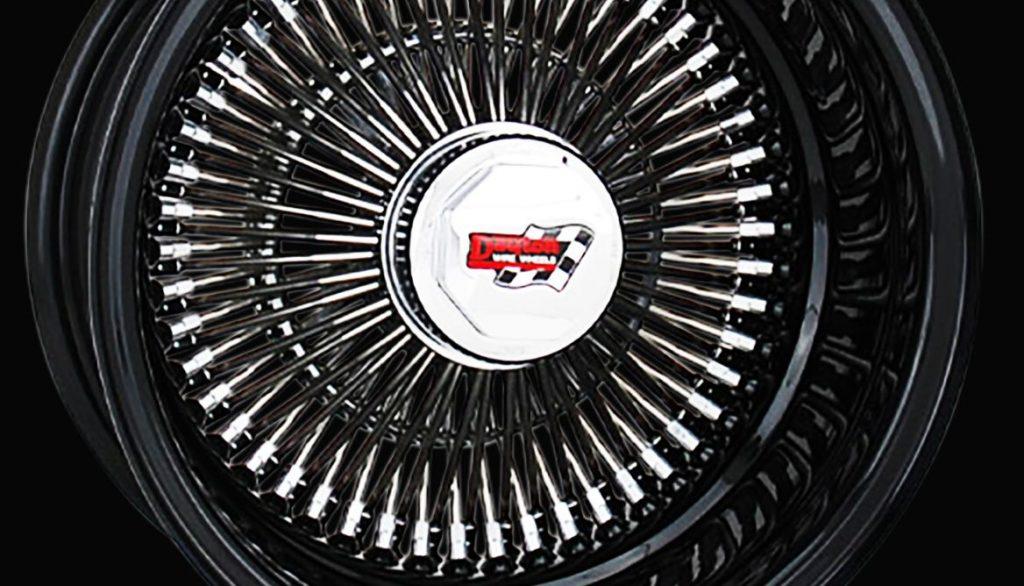
Authentic wheels should feel substantial when you pick them up. A good rule of thumb is to compare the weight of your wheels to those of a similar size from a reputable brand.
You should also look for any inconsistencies in the weight of the wheels. Uneven weight can be a sign that they are not authentic. Additionally, fake wheels tend to be much lighter than genuine ones. It’s important to note that Dayton varies in weight depending on the style, so make sure to compare them with the right type.
For example, 3-piece lightweight wheels will be noticeably lighter than 5-piece heavyweights.
Finally, if you’re buying your wheels online and don’t have a chance to test their weight, try reading reviews and looking at pictures. If customers mention that they felt like their new Spoke wheel was too light or heavy, this could indicate authenticity.
“Dayton” Should Be Spelled Correctly
When looking for a real spoke wheel, one of the first things to check is if the spelling is correct. While there are many brands of aftermarket wheels, the name Dayton should always be spelled correctly.
Look for an e at the end and two ts in the middle, as Dayton is a trademarked name. If you come across any wheel with different spelling, it’s likely a knock-off and not genuine.
There Should Be A Serial Number
When purchasing Dayton, it’s important to ensure you get a genuine set. One way to do this is to look for a serial number on the wheels. Dayton features a unique serial number that can be used to identify them as authentic.
You’ll need to check the inside of the wheel’s rim to find the serial number. This serial number can help you verify that the wheels are genuine Dayton wheels.
If you’re buying wheels secondhand, it’s especially important to ensure they have a valid serial number. If the serial number is missing or doesn’t match the correct one for your set of wheels, then there’s a good chance that the wheels are not real Dayton wheels. It’s always best to double-check with an expert if you’re unsure.
Company’s Logo
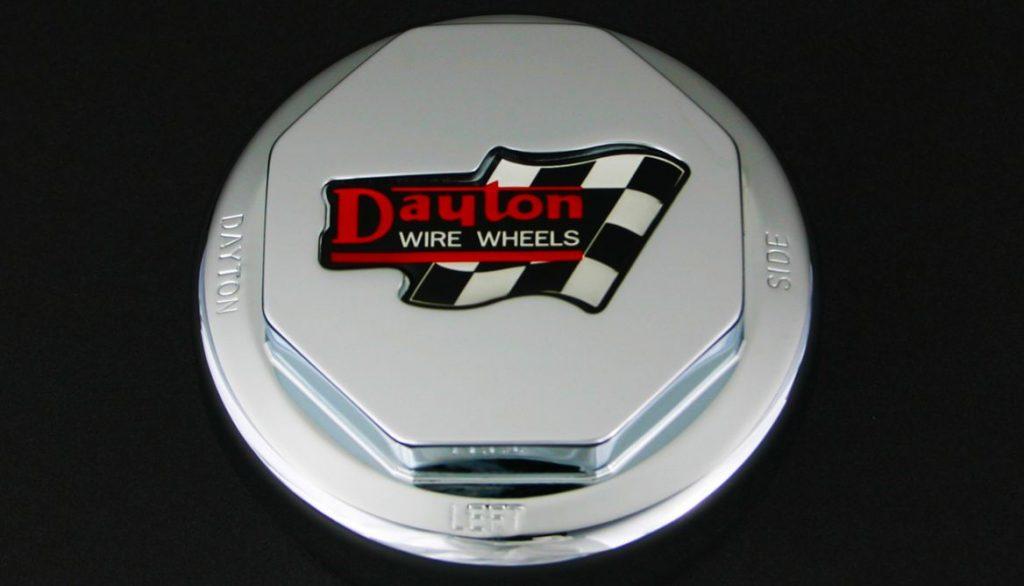
When it comes to determining the authenticity of Dayton wheels, one of the most important pieces of information you can look for is the company’s logo. Dayton is known for their distinct designs and logos, which can help you identify a genuine wheel from a counterfeit one.
Here are different ways to identify the company’s logo when it comes to these wheels:
- Look at the center hub: A genuine Dayton wheel should feature the Dayton logo in the center hub. This logo typically includes a simple black outline of an American flag with Dayton written across it. The logo is usually encased within a metal circle, although later models may feature a different symbol.
- Look at the rim area: They often feature the logo in the rim area as well. This logo is generally more intricate than the center hub one and often includes a colored pattern of stars and stripes in addition to the name Dayton.
- Look for embossed letters: They are also known for their distinctive embossed lettering around the edge of the wheel. This lettering typically features the full company name or initials and a small image of an eagle or other patriotic symbol.
FAQs
What Are Budd Style Wheels?
Budd wheels are a type of wheel that Edward Budd Manufacturing Company developed in the 1930s. These wheels feature a steel disc with two rims and two drop centers, which offer increased strength and stability. Budd-style wheels have become popular for their durability, affordability, and lightweight.
Are Dayton Rims Still Made?
The short answer is yes, Dayton wheels are still being produced. Dayton was founded in 1918 and has been a leading manufacturer of wheels for automobiles, buses, trucks, trailers, and farm equipment for over 100 years.
Are Dayton Rims Safe?
These wheels are a popular choice amongst car owners due to their strong and reliable construction, making them a safe option. They are also corrosion-resistant, ensuring they last for many years.
Conclusion
The verdict is in: Dayton Wheels and Budd Wheels are two of the best wheel options on the market. Both come with their own unique features and benefits, making them great choices for different purposes. Daytona wheels offer superior strength and durability, making them ideal for heavy-duty applications.
Budd Wheels provide excellent performance and maneuverability, making them ideal for lighter loads and tight corners. Ultimately, it comes down to your specific needs when deciding which wheel option is best for you. Whichever you choose, you can be sure that you’re getting a quality product that will stand up to the test of time.
Which wheel will you like to pick among these two and why? Please tell us in the comment section.

Asen is the owner and main contributor of Camper Life. He is a full-time RV traveler since 2018. He loves camping in nature, fishing, and spending time with his family.
Striving to provide the most valuable information about campers and RVs, he shares everything he learned over the years.
That’s why Camper Life is one of the best sources to find information about RV traveling and living.









![How to Design Your Camper Van Layout? [Best Camper Van Design Apps]](https://camperlife.co/wp-content/uploads/2019/04/17Camper-Van-Layouts-.jpg)




